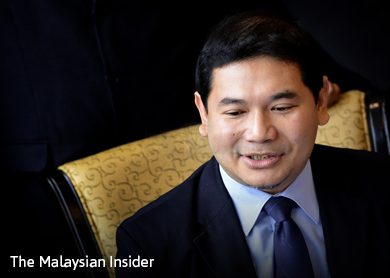
(Oct 27): Be prepared for a higher goods and services tax (GST) if the price of crude oil drops below US$48 per barrel next year, an opposition lawmaker said.
Pandan MP Rafizi Rami said the much-criticised consumption tax was the second largest source of funds for the government because of shrinking revenues from oil.
Rafizi said the government’s expenditure next year was based on the assumption that the crude oil price would stay at US$48 per barrel.
This will yield about RM9 billion in taxes and dividends from national oil producer Petronas.
Some analysts predicted that the price of oil could drop to as low as US$20 per barrel next year because of a sluggish global economy, said Rafizi.
“When that happens, there will be a hole in the government budget that needs to be filled,” Rafizi told a forum last night titled “Budget 2016: managing or triggering a crisis?”
Putrajaya has limited options on how to make up for the shortfall in revenue, Rafizi said.
It cannot borrow any more money because its debts are already so high, so it will have to go back to the public.
“This is the danger with the GST. It is like opium. Whenever the government needs money, it thinks it can just raise the rate because the thinking is the public is already used to the pain of paying GST,” Rafizi said.
“So (Prime Minister Datuk Seri) Najib Razak can just raise GST to 7% or 8% even though he is essentially taxing the poor to pay for his expenses.”
Budget 2016 has set aside RM267.2 billion for operating and development expenses, while revenue is only expected to be RM225.7 billion.
The government expects to raise RM39 billion from GST alone, making it the second largest source of funds after corporate taxes at RM74.4 billion.
Rafizi said the clear policy shift this year was the government’s move to increase revenue by taxing citizens instead of relying on Petronas and government-linked companies.
The amount of money that Putrajaya collected from the public also dwarfed the amount it gave back to the public through handouts like the 1Malaysia People’s Aid Scheme (BR1M), said another speaker at the forum, Dr Dzulkefly Ahmad of Parti Amanah Negara (Amanah).
BR1M recipients will receive an extra RM50 in the two income brackets.
The groups are households earning between RM3,001 and RM4,000 a month (RM750 up by RM800) and individual income earners below RM2,000 a month will also get RM400 up from RM350. Those earning below RM3,000 a month will see a jump from RM950 to RM1,100.
Under Budget 2016, those earning below RM1,000 will get RM1,050.
This will impact on at least 4.7 million households with incomes of below RM4,000 a month and 2.7 million individuals with incomes below RM2,000 a month.
The government is also inconsistent over where it wants to spend next year’s revenue, said Serdang MP Dr Ong Kian Ming.
“Most of the ministries and departments are seeing budget cuts but allocations to the Prime Minister’s Department has gone up to the highest it’s been at RM20 billion. Yet this is happening while subsidies for cooking oil and petrol are being cut from the public,” said Ong. – The Malaysian Insider